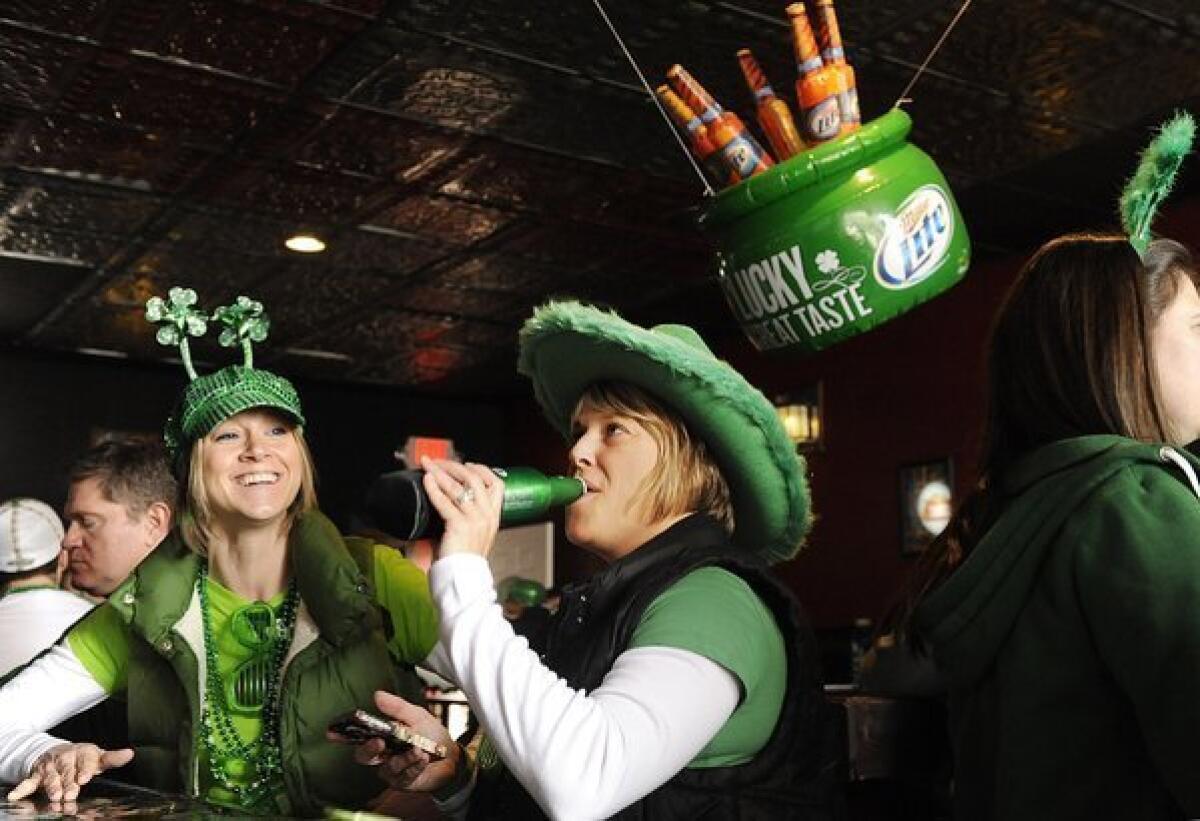Celebrate St. Patrick’s Day? Here’s why you’ve got a hangover.

- Share via
Did you celebrate St. Patrick’s Day with a few too many green beers? Are you experiencing the medical condition commonly known as a hangover?
As you do your best to cope, you might take some solace in the fact that scientists believe humans have been suffering from hangovers ever since our prehistoric ancestors discovered the mind-altering qualities of fermented beverages. “Descriptions of hangovers appear in the writings of ancient Egypt and Greece as well as in the Old Testament,” according to this excellent review article, “Alcohol Hangover: Mechanisms and Mediators.”
If you drink until you become drunk, your chances of developing a hangover are pretty decent; the more you drink, the better your odds. A hangover doesn’t begin until several hours after you’ve had your last drink, and it can persist for 24 hours.
“Physical symptoms of a hangover include fatigue, headache, increased sensitivity to light and sound, redness of the eyes, muscle aches, and thirst,” write Dr. Robert Swift and Dena Davidson in “Alcohol Hangover.” These ailments can be accompanied by rapid heartbeat, high blood pressure, sweating, feelings of dizziness and vertigo, depression, anxiety and irritability.
Drinking alcohol prompts many changes in the body, all of which are ultimately unpleasant:
* In the brain, the posterior pituitary gland stops secreting a hormone called arginine vasopressin. Without it, the kidneys don’t absorb as much water as the body needs. That water is lost as urine -- if you consume about four drinks-worth of alcohol, you can lose up to a quart of water in just a few hours. Then you’re dehydrated.
* If all that drinking makes you throw up, gives you diarrhea or causes you to sweat, you’ll become even more dehydrated.
* In your gut, the alcohol upsets the lining of your stomach and your intestines. The contents of your stomach get processed less efficiently, so they stick around longer.
* As your body metabolizes alcohol, it’s too busy making lactic acid, triglycerides and fatty acids to produce enough glucose to keep your brain in optimal condition. When you’re short on glucose, you can feel weakness, fatigue and a general feeling of crankiness.
* Excessive drinking also makes you sleep-deprived, since you not only sleep for fewer hours but the sleep you do get is less restful.
The alcohol you consumed isn’t entirely responsible for all your ills. Other ingredients in alcoholic beverages -- notably methanol and sometimes even arsenic -- can cause headaches too, according to this explainer from ilovebacteria.com.
Hangovers aren’t just annoying, there’s some evidence they may be hazardous to your health. For instance, a study published last year in the journal Acta Neurologica Scandinavica found that men who had at least one hangover per year were more than twice as likely to suffer a stroke compared to men who had no hangovers.
Researchers still have much to learn about hangovers, not least of which is how to treat one. So far, not one alleged remedy has been shown to substantially outperform a placebo in a well-controlled clinical trial, and none have been approved by the Food and Drug Administration, according to this editorial published last year in the journal Current Drug Abuse Reviews.
“It has been suggested that it is unethical to develop an effective treatment for hangovers, because this may encourage alcohol consumption,” the editorial says. “A hangover is seen as a punishment for excessive alcohol consumption that prevents similar drinking behavior on future occasions. There is however no scientific evidence that supports this assumption.”
This video from the American Chemical Society offers a few tips to reduce your chance of a hangover the next time you go out drinking (responsibly, of course):
* Try mixing your alcohol with soda water, since carbon dioxide will speed alcohol’s exit from the body.
* Choose clear liquors like vodka and gin, which contain fewer hangover-inducing chemicals called congeners compared with darker liquors like brandy and whiskey.
In the meantime, hang in there!
Return to the Science Now blog.
Follow me on Twitter @LATkarenkaplan







